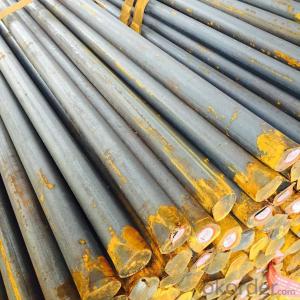4140 Alloy Steel, 1.7225 Steel Material, SCM440 Steel Bar
- Loading Port:
- China main port
- Payment Terms:
- TT OR LC
- Min Order Qty:
- 30 m.t.
- Supply Capability:
- 10000 m.t./month
OKorder Service Pledge
OKorder Financial Service
You Might Also Like
Item specifice
4140 Alloy Steel, 1.7225 Steel Material, SCM440 Steel Bar
Product information:
1. Dia:12mm-300mm
2. Standard Performed: ASTM A29/A29M-04
Equal Standard:
America Standard: AISI4140
International Standard: 42CrMo4
Japan Standard: SCM440
Germany Standard: 42CrMo4
4.Grade:ASTM A29 4140 42CrMo SCM440
Hardness:217HB
Tensile strength:1080(110)MPA
Yield strength: 930(95)MPA
elogation:12% Reduction of area:45% AKV(impact value):63J
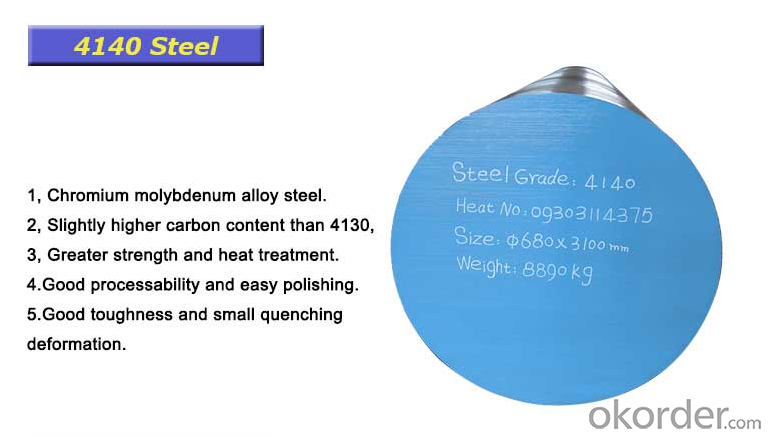
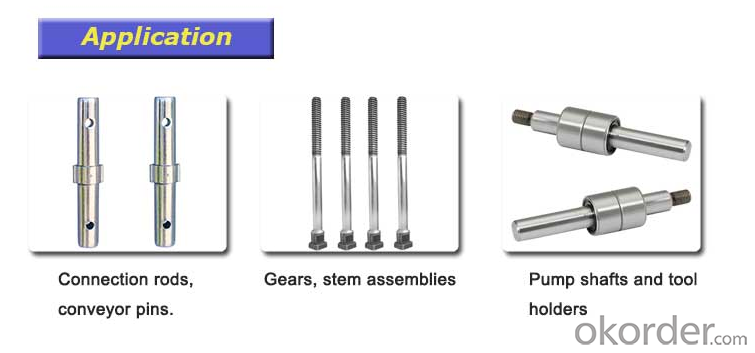
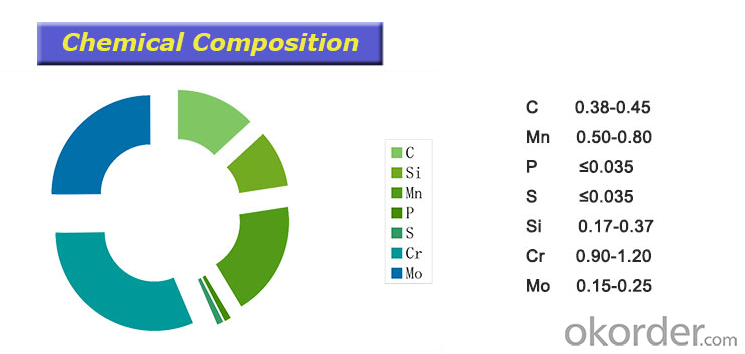
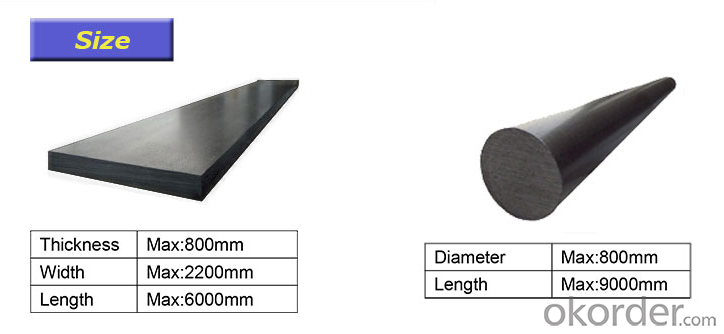

Product show:
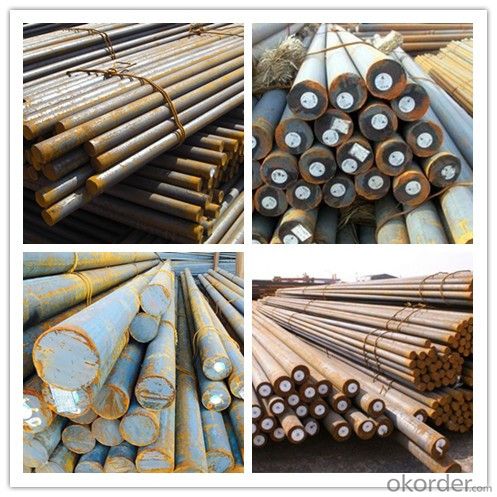
Workshop show:
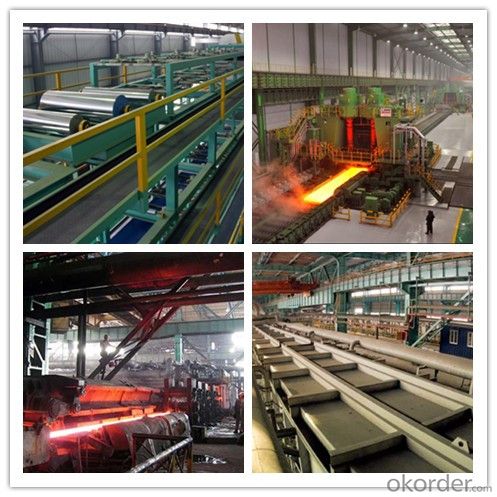
Our service:
-High manufacturing accuracy
-High strength
-Small inertia resistance
-Strong heat dissipation ability
-Good visual effect
-Reasonable price
Chose happens because of quality, then price, We can give you both.Additionally, we can also offer professional products inquiry, products knowledge train(for agents), smooth goods delivery, exellent customer solution proposals.Our service formula: good quality+good price+good service=customer's trust
SGS test is available, customer inspection before shipping is welcome, third party inspection is no problem.
If you need the sample, please feel free to let me know. Any question, we will contact you ASAP!
- Q:How is nitriding steel used in the production of tools and dies?
- Nitriding steel is used in the production of tools and dies through a process called nitriding. This involves introducing nitrogen into the surface of the steel, which forms a hard layer of nitrides, increasing the overall hardness, wear resistance, and corrosion resistance of the material. This enhanced surface hardness makes the tools and dies more durable and long-lasting, allowing them to withstand the high stresses and temperatures experienced during cutting, forming, and shaping processes. Additionally, nitriding steel can also improve the fatigue strength and reduce the friction of the tools and dies, enhancing their performance and efficiency in various industrial applications.
- Q:What are the different special steel products available in the market?
- There are a wide variety of special steel products available in the market, each designed to meet specific industrial needs. Some of the common special steel products include: 1. Stainless Steel: This is a corrosion-resistant steel alloy that contains a minimum of 10.5% chromium. It is widely used in applications that require high resistance to corrosion, such as kitchen utensils, medical instruments, and chemical processing equipment. 2. Tool Steel: Tool steel is a type of carbon and alloy steel that is specifically designed to be used in the manufacturing of tools. It is known for its high hardness, resistance to abrasion, and ability to retain sharp edges. Tool steel is commonly used in the production of cutting tools, dies, and molds. 3. Alloy Steel: Alloy steel is a steel that has been alloyed with other elements, such as manganese, silicon, nickel, or chromium, to enhance its mechanical properties. It offers improved strength, toughness, and wear resistance compared to carbon steel. Alloy steel is used in various applications, including automotive components, construction equipment, and machinery parts. 4. High-Speed Steel: High-speed steel is a type of tool steel that is capable of cutting at high speeds without losing its hardness or ability to retain sharp edges. It is commonly used in the production of drills, milling cutters, and saw blades. 5. Spring Steel: Spring steel is a low-alloy, medium or high carbon steel that is known for its ability to retain its shape and elasticity even under high stress or repeated loadings. It is widely used in the manufacturing of springs, suspension systems, and shock absorbers. 6. Electrical Steel: Electrical steel, also known as silicon steel, is a specialized steel alloy that exhibits low electrical losses and high magnetic permeability. It is used in the production of electrical transformers, motors, and generators. 7. Heat-Resistant Steel: Heat-resistant steel is designed to withstand high temperatures without losing its mechanical properties. It is commonly used in applications such as furnaces, heat exchangers, and gas turbines. These are just a few examples of special steel products available in the market. The choice of steel product depends on the specific requirements of the application, including factors such as corrosion resistance, strength, hardness, and heat resistance.
- Q:How does molybdenum improve the performance of special steel?
- Molybdenum plays a crucial role in enhancing the performance of special steel due to its unique properties and characteristics. First and foremost, molybdenum significantly improves the strength and toughness of steel, making it more durable and resistant to deformation. This is achieved by forming a solid solution with iron, which results in a fine-grained microstructure and reduces the formation of brittle phases in the steel. Moreover, molybdenum increases the hardenability of steel, allowing it to be heat-treated to obtain desired mechanical properties. This is particularly important in the production of special steel, where high strength, wear resistance, and thermal stability are often required. By enabling effective heat treatment, molybdenum ensures that the steel can be processed to meet specific performance requirements, such as hardness, toughness, and dimensional stability. Additionally, molybdenum enhances the corrosion resistance of special steel, making it suitable for various challenging environments. It forms a protective oxide layer on the surface of the steel, which acts as a barrier against corrosive substances like acids, alkalis, and salts. This resistance to corrosion is crucial in applications where the steel is exposed to harsh conditions, such as marine environments, chemical processing plants, and oil and gas industries. Furthermore, molybdenum improves the high-temperature strength and creep resistance of special steel. It enables the steel to maintain its mechanical properties even at elevated temperatures, making it suitable for applications where the steel is subject to prolonged exposure to heat or mechanical stress. In summary, molybdenum plays a vital role in enhancing the performance of special steel by improving its strength, toughness, hardenability, corrosion resistance, and high-temperature properties. These attributes make molybdenum an essential alloying element in the production of special steel for various industries, including automotive, aerospace, energy, and tool manufacturing.
- Q:How does hot rolling affect the microstructure of special steel?
- Hot rolling affects the microstructure of special steel by causing recrystallization and grain growth. The high temperature during the rolling process allows the steel to undergo plastic deformation, leading to the formation of new grains with a finer size. This results in improved mechanical properties such as increased hardness and strength. Additionally, hot rolling can also help in eliminating any residual stresses and improving the overall homogeneity of the steel's microstructure.
- Q:How does special steel contribute to the aerospace turbine industry?
- Special steel plays a crucial role in the aerospace turbine industry as it offers exceptional strength, corrosion resistance, and high-temperature stability required for the demanding operating conditions of turbine components. It enables the production of turbine blades, discs, and other critical parts that can withstand extreme temperatures and stresses, ensuring optimal performance and safety in aircraft engines. Additionally, special steel's excellent fatigue resistance and ability to retain mechanical properties at elevated temperatures contribute to enhanced fuel efficiency and durability, ultimately advancing the overall efficiency and reliability of aerospace turbines.
- Q:Can special steel be used for making defense industry components?
- Yes, special steel can be used for making defense industry components. Special steel alloys possess superior strength, durability, and resistance to wear, making them ideal for manufacturing critical defense components that require high performance under extreme conditions. Additionally, special steel can be tailored to meet various specific requirements of defense applications, such as ballistic protection, corrosion resistance, and heat resistance.
- Q:What are the different types of tool steels used in special steel?
- Some of the different types of tool steels used in special steel include high-speed steels, cold work steels, hot work steels, and plastic mold steels. Each type of tool steel is designed to have specific properties that make it suitable for different applications, such as cutting, shaping, or molding materials.
- Q:What are the main advantages of using special steel in the automotive racing industry?
- The main advantages of using special steel in the automotive racing industry are its high strength-to-weight ratio, exceptional durability, and excellent thermal conductivity. Special steel allows for the construction of lighter and stronger components, enhancing the overall performance and speed of racing vehicles. It also ensures greater safety for drivers by providing increased resistance to impact and fatigue. Furthermore, the superior thermal conductivity of special steel aids in dissipating heat generated during intense racing conditions, preventing overheating and maintaining optimal engine performance.
- Q:How are copper alloys used in electrical applications?
- Copper alloys are extensively used in electrical applications due to their excellent electrical conductivity and thermal properties. They are used in the production of electrical wires, connectors, and busbars, ensuring efficient transmission of electricity. Copper alloys also offer good corrosion resistance, making them suitable for outdoor and marine electrical systems. Additionally, their high strength and ductility allow for easy fabrication and installation in various electrical components.
- Q:What are the properties of case-hardening steel?
- Case-hardening steel is a type of steel that possesses surface hardness and wear resistance while maintaining a relatively soft and tough interior. It is achieved by introducing carbon into the outer layer of the steel through a process called carburization, which forms a hardened case. The core of the steel remains relatively softer, providing toughness and resistance to impact. This combination of properties makes case-hardening steel ideal for applications requiring a hard and durable outer surface, such as gears, bearings, and tools.
1. Manufacturer Overview |
|
|---|---|
| Location | |
| Year Established | |
| Annual Output Value | |
| Main Markets | |
| Company Certifications | |
2. Manufacturer Certificates |
|
|---|---|
| a) Certification Name | |
| Range | |
| Reference | |
| Validity Period | |
3. Manufacturer Capability |
|
|---|---|
| a)Trade Capacity | |
| Nearest Port | |
| Export Percentage | |
| No.of Employees in Trade Department | |
| Language Spoken: | |
| b)Factory Information | |
| Factory Size: | |
| No. of Production Lines | |
| Contract Manufacturing | |
| Product Price Range | |
Send your message to us
4140 Alloy Steel, 1.7225 Steel Material, SCM440 Steel Bar
- Loading Port:
- China main port
- Payment Terms:
- TT OR LC
- Min Order Qty:
- 30 m.t.
- Supply Capability:
- 10000 m.t./month
OKorder Service Pledge
OKorder Financial Service
Similar products
New products
Hot products
Related keywords

